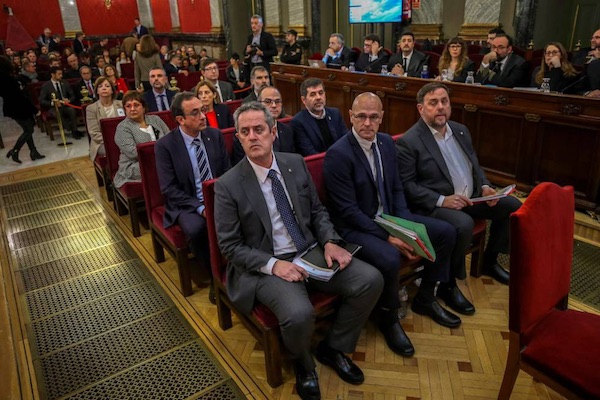
The trial of the 12 Catalan political prisoners is underway, with the state prosecutor asking for sentences of between 11 and 25 years. The body in charge of passing judgment is the supreme court, which will consider the accusations presented by the prosecutor’s office of rebellion, sedition and embezzlement. Their crime: having organised the 1 October 2017 referendum on Catalan independence.
The 12 elected politicians and mass movement leaders in the dock have spent the last year and a half in preventive detention: a totally disproportionate measure that shows the vengeful and repressive nature of the Spanish state apparatus. The threat of “breaking up” Spain posed by the mass movement in Catalonia enraged the right wing and the state apparatus, which in its eagerness to punish the leaders has bent the (limited) framework of its own legality.
In November 2017, article 155 of the Spanish constitution was applied to suspend Catalonia’s self-government by imposing direct rule from the Spanish Government. Then-President Rajoy called fresh Catalan elections in the hope of breaking the dominance of the independence parties. However, the independence parties revalidated their mandate, humiliating the regime, while greatly complicating the decapitation of the Catalan republican struggle. Although Ciudadanos was the party that received the most votes, Puigdemont enjoyed the democratic mandate of a majority in the new Catalan Parliament to be re-elected as president.
The supreme court and the constitutional court, however, prohibited the Catalan Parliament from electing its president, demanding someone that hadn’t been involved in the events of October 2017. Finally, after three failed attempts to appoint a president, Quim Torra, a little-known politician, was voted in to lead the Catalan Generalitat. The Spanish regime showed in practice that bourgeois democracy, and its legality, are mere instruments in their hands that they decide to use or throw away to safeguard their interests.
The accusation of rebellion, which is the main crime being tried, hasn’t enjoyed much prominence so far. The little attention it has received has been mostly based around the Civil Guard cars that were damaged during the 20 September 2017 protest, when 40,000 people spontaneously surrounded the Ministry of Finance in Barcelona to reject the detention of several leaders of the independence movement. The reason? Because it is totally scandalous and false that the Catalan leaders can be tried for an armed uprising, which is the definition of rebellion in the Spanish penal code. Firstly, the leaders of the movement did not at any time make an appeal to an armed insurrection, they did not organise the taking of strategic points (such as communications, transport, geographical points, etc.), barracks were not assaulted, etc.
The Spanish state did not react with a declaration of a state of siege as would be expected from a challenge of such magnitude. The indictment for rebellion is so untenable that the Spanish prosecutor’s office failed to get Catalan president Puigdemont extradited from Germany on these grounds, not even with the help of the German prosecutor.
Moreover, the accusation is so spurious that it has been questioned by more than 200 professors of criminal law, and even by Pascual Sala, who was president of the supreme and constitutional courts. With this, as La Vanguardia (Spanish newspaper) explains, the prosecution will need the help of the majority of its 256 witnesses to justify the “violence” necessary for the crime of rebellion. These witnesses have been selected with care, and others, such as the Sindic de Greuges, a Catalan institution that is in charge of guaranteeing the rights of citizens before public administrations and that would provide information and objective data to the trial, were rejected because they would not conform to the state’s version of reality.
Sinn Fein’s spokesperson on Foreign Affairs, Sean Crowe TD, attended the trial alongside party colleague and MEP for Dublin, Lynn Boylan. He said he did so to show Sinn Fein’s support and solidarity with the former Ministers, the Members of the Catalan Parliament, and the civil society activists that are on trial.
“These 12 political and civil leaders are in the dock in what has all the trappings of a political trial. It is our belief that their prosecution is politically motivated and they are political prisoners. Facilitating people to vote is not a crime, but preventing them by force should be.”
He added: “This is a political issue, not a legal one. The Spanish Government needs to enter into meaningful dialogue with the Catalan Government to find a political solution. It needs to stop using the police and the legal system to attack the Catalan independence movement, which is a legitimate political movement.
“This is one of the most pressing political issues in Europe. We cannot ignore this important issue of citizens being prosecuted for pursuing purely peaceful and democratic means in determining their future.”
![[Irish Republican News]](https://republican-news.org/graphics/title_gifs/rn.gif)
![[Irish Republican News]](https://republican-news.org/graphics/title_gifs/harp.gif)

